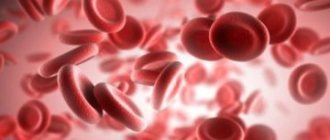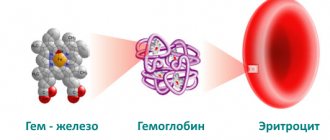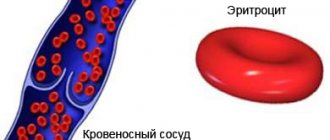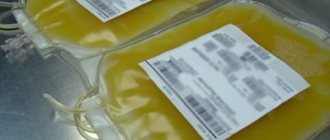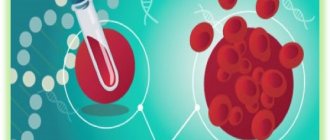Stroke
Vomit
Gastritis
Hepatitis
22337 January 16
IMPORTANT!
The information in this section cannot be used for self-diagnosis and self-treatment.
In case of pain or other exacerbation of the disease, diagnostic tests should be prescribed only by the attending physician. To make a diagnosis and properly prescribe treatment, you should contact your doctor. We remind you that independent interpretation of the results is unacceptable; the information below is for reference only.
Folic acid (vitamin B): indications for use, rules for preparing for the test, interpretation of results and normal indicators.
Detailed description of the study
Folates are salts of folic acid, which plays an important role in hematopoiesis. With insufficient folic acid, a special type of anemia develops - folate deficiency anemia. The most common causes of low folate levels in the blood are:
- impaired absorption of folic acid in the gastrointestinal tract (resection of the stomach, intestines, malabsorption syndrome, etc.);
- insufficient intake of folic acid from food;
- increased consumption of folic acid (pregnancy, lactation, active growth and maturation in children, fever, sepsis, etc.);
- alcoholism;
- some kidney diseases;
- taking medications that interfere with the absorption of folic acid (hormonal contraceptives, aspirin, cytostatics, etc.);
- oncological diseases;
Elevated levels of folate in the blood are rare and are usually associated with long-term use of medications containing folic acid.
Folate is a natural form of vitamin B9. The source is the intestinal microflora. Partially comes from food (spinach, lettuce, beans, asparagus, grains, wholemeal). One of the most important functions of vitamin B9 in the body is the regulation of hematopoietic processes. Folates are necessary for the differentiation of red blood cells and for the normal functioning of the bone marrow and nervous system.
Folate deficiency can lead to spontaneous miscarriages, premature birth, and premature placental abruption. Lack of folate can also cause congenital intrauterine malformations (CHD) of the cardiovascular and nervous systems of the fetus. Supplementing with folate during pregnancy can reduce the risk of neural tube defects by 85%. Folate absorption disorders can be caused by an unbalanced diet low in fresh fruits and vegetables, old age, taking medications, and celiac disease. Folate reserves in the body are relatively small, and therefore deficiency can develop within 1 month after cessation of its supply, and anemia - after 4 months.
The first symptoms of folate deficiency are weakness, irritability, decreased concentration and loss of appetite, followed by inflammation of the mucous membranes, anemia and neurological disorders. Folic acid and atherosclerosis. Folate deficiency is one of the main causes of hyperhomocysteinemia. And it, in turn, is an independent risk factor for the early development of atherosclerosis. Determination of folate levels can be carried out as part of an analysis of the risk of developing coronary heart disease.
Preparing for a folic acid blood test
The optimal time for taking blood is 8-11 am. The study is carried out on an empty stomach. The last meal should take place at least 8 hours before the procedure, and overeating should be avoided beforehand. You can drink clean still water. The day before donating blood, you must refuse:
- from alcohol;
- from increased physical activity;
- from fatty foods, fried foods.
Some medications (antibiotics, hormonal contraceptives, anti-seizure medications) can distort test results. Therefore, it is better to conduct the study before starting or at least a week after completing the course of taking them. If the patient is already undergoing treatment with any drugs and it is impossible to interrupt it, he must tell the doctor about this (list the names of the drugs and indicate their dosage). The doctor will note this information in the referral, and it will be taken into account when conducting the study.
Children under five years of age are given boiled water before the test. Within half an hour, they need to drink 150 to 200 ml of liquid in small portions.
It is not advisable to do a blood test for folic acid immediately after:
- fluorography;
- physiotherapy session;
- Ultrasound;
- rectal examinations;
- radiography.
You must take with you your outpatient card and the results of previous studies, if any. It is recommended to arrive 15-20 minutes before donating blood and sit quietly.
What else is prescribed with this study?
Vitamin B12
4.4. Venous blood 1 day
960 RUR Add to cart
Homocysteine
1.53. Venous blood 1 day
RUR 1,890 Add to cart
Clinical blood test with leukocyte count and ESR (with microscopy of a blood smear to detect pathological changes) (venous blood)
3.9.1. Venous blood 1 day
720 RUR Add to cart
Folate metabolism
GNP047 Venous blood, DNA extraction 3 days
RUR 3,750 Add to cart
Functions of folic acid in the body
The relevance of the problem of vitamin B9 deficiency is due to its extreme importance for normal human life. The functions of folic acid include the following:
- participates in hematopoiesis, is responsible for hemoglobin levels;
- ensures normal metabolism of fats and carbohydrates;
- stimulates the production of serotonin and other “happiness hormones”;
- improves the functioning of the digestive system;
- participates in iron synthesis;
- promotes cell growth and renewal, stimulates tissue regeneration.
We have prepared for you a list of studies that will help you deal with this problem:
30 working days
Panel "Complications of pregnancy"
12000 rub.
More details
14 working days
Panel "Folate cycle and risk of hyperhomocysteinemia" - 10 markers
8500 rub.
More details
5 working days
Analysis of polymorphisms in folate cycle genes
4900 rub.
More details
Folic acid: daily dosage and how to take it
Folic acid is a substance with rapid metabolism, so large reserves of the vitamin in the body, as a rule, are not formed. The substance is poorly absorbed if the body is depleted by stress, constant fatigue or chronic diseases. Some people have a genetic disorder in folic acid metabolism.
The synthesis of vitamin B9 is also affected by the amount of food eaten. Strict diets lead to the depletion of all useful elements in the body, including folic acid. Alcohol and caffeine interfere with the full absorption of the vitamin.
How to take folic acid correctly? First of all, it is important to know what vitamins it is combined with. Vitamin B12 regulates the absorption of the substance, and vitamin B6 affects the metabolic process, so taking folic acid should be supplemented with these components.
It is best to take vitamin B9 as part of vitamin complexes. In addition, in this form the substance does not decompose under the influence of light or heat treatment. The absorption of synthetic vitamin by body tissues reaches 80%. Taking a dietary supplement quickly restores the balance of the substance even in cases of severe vitamin deficiency.
Folic acid: how to take
The daily intake recommended by the World Health Organization depends on age characteristics:
| Age | Folic acid intake per day |
| Up to 1 year | 50 mcg |
| 1-3 years | 70 mcg |
| 4-6 years | 100 mcg |
| 6-10 years | 150 mcg |
| 11-18 years old | 200 mcg |
| Adults | 200-400 mcg |
The need for vitamin B9 increases with age, after injuries and illnesses, and during active training in athletes. The largest amount of vitamin B9 is required by pregnant and lactating women - about 600 mcg per day.
Modern folic acid preparations are presented in different release forms:
- pills;
- lollipops;
- capsules;
- lozenges;
- liquid form.
Traditionally, folic acid is taken after meals. The dosage depends on the age and purpose of use: adults take 1-2 tablets 1-3 times a day, and children - from ¼ to 1 tablet per day. A preventive course of taking the vitamin is recommended two to three times throughout the year. There is only one absolute contraindication to use - individual intolerance.
What is folic acid?
Folic acid is vitamin B9, which is essential for the production of healthy red blood cells and DNA synthesis. In fact, there is some confusion in terms. There are natural and synthetic forms of vitamin B9. Just folic or pteroylmonoglutamic acid is the name of the synthetic form that is found in vitamin food supplements and artificially fortified foods. A group of natural compounds is collectively called folates, and they are found in foods. But often the concepts of folic acid and folate are used interchangeably, especially in Russian-language literature. Therefore, during a blood test, the presence of vitamin B9 in the body is determined, regardless of its origin (natural or artificial). In the following, everything is called folic acid.
Folic acid is absorbed through the small intestine and stored in the liver. It must be supplied to the body through food because it cannot be produced by the body itself.2
Main sources include:
- leafy, green vegetables;
- fresh fruits and vegetables;
- organ meat;
- yeast;
- fortified cereals and cereals.2
What are the dangers of folic acid deficiency?
Women who are pregnant or planning to become pregnant need extra folic acid to produce more red blood cells and support the normal growth of their baby. Those who don't get enough of this vitamin before and during pregnancy are more likely to have babies with birth defects, such as a cleft lip or cleft palate, or a neural tube defect, such as spina bifida.
In addition, a lack of folic acid can lead to a serious problem such as megaloblastic anemia. Mild deficiency usually has no symptoms, but severe deficiency can cause tongue pain, diarrhea, headaches, weakness, forgetfulness and fatigue.
Who is at risk?
Folate deficiency may be more common in people who:
- pregnant;
- are gastrointestinal surgery patients;
- have digestive disorders such as celiac disease, cystic fibrosis or Crohn's disease;
- suffer from chronic alcoholism;
- malnourished or suffering from malabsorption (inadequate absorption);
- are taking anticonvulsant medications such as phenytoin (Dilantin).2
general characteristics
Folates are derivatives of folic acid (vitamin B9), playing a leading role in a wide range of vital processes: they stimulate erythropoiesis, participate in the synthesis of amino acids, nucleic acids, purines, pyrimidines, vitamins, participate in the metabolism of choline, histidine, in DNA and RNA methylation, promote the regeneration of muscle tissue, the development of rapidly growing tissues (skin, gastrointestinal tract membranes, bone marrow), play a protective role during pregnancy from teratogenic and damaging factors on the fetus, promote the maturation and functioning of the placenta, and have an estrogen-like effect. These functions are realized during the Folate cycle - a cascade process of synthesis of the amino acid methionine from homocysteine, controlled by 3 enzymes: methylenetetrahydrofolate reductase (MTHFR), methionine synthase (MTR) and methionine synthase reductase (MTRR). In the folate cycle, folates are coenzymes. The main causes of folate cycle disorders: 1. Genetic defects of the folate cycle enzymes MTHFR, MTR and MTRR. 2 Vitamin deficiency: folic acid, vitamins B6 and B12, involved in folate metabolism. Genetic defects of enzymes lead to a decrease in their functional activity, disruption of the folate cycle, accumulation of homocysteine in cells and an increase in the level of homocysteine in the blood plasma, which has a pronounced thrombophilic, toxic, atherogenic effect and causes an increased risk of developing a number of pathological processes: * Complications of pregnancy (fetoplacental insufficiency , premature abruption of a normally located placenta, late gestosis) * Prenatal death and fetal development defects (neural tube cleft, anencephaly, deformation of the facial skeleton) * Cardiovascular diseases (coronary heart disease, atherosclerosis, myocardial infarction, thrombosis) * Carcinogenesis (colorectal adenoma , breast and ovarian cancer) and increased side effects during chemotherapy * Ectopia lens * Osteoporosis
Folic acid: what is it for?
Folic acid is a synthetic version of the substance folate, which belongs to the group of vitamins B (B9). It is an essential element for the human body. Along with other B vitamins and minerals (zinc, magnesium), folate is actively involved in vital biochemical processes.
These include:
- maintaining the integrity of cell membranes;
- cell division;
- synthesis of red and white blood cells;
- detoxification;
- hormone balance;
- converting carbohydrates into energy;
- myelination of nerve fibers (if the function is impaired, problems with coordination are noted);
- mental health.
Vitamin B9 triggers the growth of new cells in the human body and maintains DNA integrity. Failures of these processes are fraught with the growth of tumors, so the substance can prevent cancer. The vitamin is also very important for hematopoiesis - with a serious lack of it, anemia can develop.
Our immunity, cardiovascular system and metabolism need folic acid, since vitamin B9 has a direct effect on the synthesis of amino acids. The substance strengthens the walls of blood vessels and promotes normal heart function, reducing the risk of heart attack. Folic acid is needed for the normal functioning of the nervous system - therefore, our psychological mood, concentration and performance depend on it.
